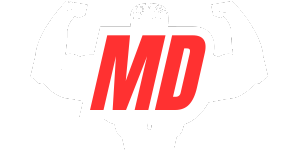While stress is a normal part of life, chronic or unmanaged stress can significantly disrupt hormonal balance and prevent consistent muscle gains. Stress doesn’t just affect the mind. It affects the body’s ability to grow, recover, and adapt to training.
For bodybuilders and athletes, the impact of stress reaches deep into the hormonal systems that regulate everything from energy levels to muscle protein synthesis.
How Stress Triggers Hormonal Changes
When your body encounters stress, it kicks a system involving the brain and adrenal glands into gear called the HPA axis. In response, your body initiates a hormonal sequence that leads to cortisol release. It is the hormone that boosts blood sugar, calms inflammation and shifts energy to where it’s needed most to handle the pressure.
In the short term, this cortisol spike is adaptive. It helps you survive high-pressure situations. However, if stress persists, the body continues releasing cortisol beyond healthy levels. It creates a hormonal environment where the body suppresses testosterone production. The body shifts its focus from building and repair to basic survival, making it difficult for muscle growth and anabolic recovery to occur efficiently.
Impact of Low Testosterone on Muscle Growth
As a major anabolic hormone, testosterone helps stimulate the muscle-building process known as hypertrophy. It promotes protein synthesis, boosts red blood cell production, supports mood and energy, and enhances the nervous system’s ability to generate strength.
When stress-induced cortisol begins suppressing testosterone, the effects become noticeable. Recovery slows, protein utilization becomes less efficient, and muscle development stalls. In many cases, strength gains diminish, and gym performance starts to feel inconsistent or stagnant.
Energy levels may dip, further reducing the drive to train. Since testosterone plays a vital role in both physical and psychological readiness, its suppression affects every layer of a bodybuilder’s progress.
Signs Your Stress Is Affecting Your Gains
If stress has been silently sabotaging your gains, it may show up in several key ways. A common indicator is fatigue, which doesn’t improve with rest. Poor gym performance, such as a drop in strength or endurance, may follow.

Disrupted sleep patterns and low libido are also strong indicators of hormonal imbalance. These symptoms often occur alongside slower recovery between training sessions. If your muscles seem to stay sore longer, and progress has stalled despite consistency in your workouts, stress might be the underlying factor.
Common Sources of Stress for Lifters
Stress comes in many forms, not just from emotional or psychological tension. Lifters commonly deal with work-life imbalance, personal relationships, and mental burnout from intense schedules.
Overtraining is another major contributor. Pushing too hard, too often, without enough rest leads to elevated cortisol and decreased testosterone.
Financial strain, social isolation, and difficulty maintaining dietary discipline can further fuel internal stress, compounding the problem for natural bodybuilders.
The Stress-Testosterone-Muscle Growth Cycle
Once chronic stress takes hold, a destructive cycle can begin. Cortisol stays high, testosterone stays low, and muscle growth becomes harder to achieve. This imbalance can discourage lifters, leading to decreased motivation and even more stress. Training output drops, recovery slows, and the gains that once came steadily begin to fade.

Worse still, some lifters may try to push through with more volume and intensity, which amplifies stress even further. Pushing your body too hard adds more stress to the system, throwing hormones further out of balance and raising the chances of injury or lasting exhaustion.
How to Manage Stress and Protect Your Gains
Make effective stress management an essential part of any serious training program. Practices like meditation, journaling, and mindfulness therapy can help manage emotional stress and lower cortisol levels naturally.

Prioritizing sleep, using active recovery methods, and building flexibility into your training schedule all help reduce the physical toll of stress. Rest is not a luxury. Your body needs it for hormonal balance and muscle repair.
Structured deload weeks and program variability allow your nervous system to reset and adapt, which preserves your ability to make progress over time.
Nutritional and Supplement Strategies
Nutrition plays a major role in managing the effects of stress on hormones. Adaptogens such as ashwagandha and Rhodiola have shown the potential to lower cortisol while supporting testosterone levels.
Your body relies on key minerals like magnesium and zinc to support hormone function and speed up recovery. Consuming adequate healthy fats from sources such as avocados, eggs, and fatty fish supports testosterone production.
Steering clear of too much caffeine, alcohol, and heavily processed foods matters just as much. These substances can disrupt your sleep or spike stress hormones, both of which slow down recovery.
When to Seek Professional Help
If you suspect that stress has seriously disrupted your hormonal balance, it may be time to consult a professional. Persistent fatigue, unexplained weight changes, mood disturbances, or loss of libido are all signs that hormone levels could be imbalanced.
Working with a physician or hormone specialist can help you assess your testosterone and cortisol levels through proper blood testing. From there, your coach can create a tailored intervention plan to restore balance and support your long-term muscle-building goals.
Frequently Asked Questions
Can overtraining be a source of stress?
Absolutely. Overtraining is a physical stressor that elevates cortisol. Without proper rest and nutrition, it can lead to decreased testosterone and poor athletic performance.
Are there any natural ways to reduce cortisol?
Yes. Practices like mindfulness meditation, adequate sleep, light cardio, and using adaptogens such as ashwagandha can help lower cortisol naturally.
Can stress completely stop muscle growth?
While it may not completely stop muscle growth, chronic stress can significantly slow it down and make it much harder to build or maintain muscle mass.



